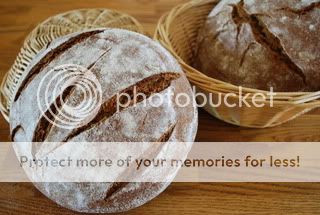This bread is growing on me. If I'm going to keep baking it, it needs a name. A really cool sounding name that may or may not make sense in it's native land. A name like: Doppelsauer Bauernbrot. Now, that's a name that sounds like it means business. There's something about Oktoberfest season that always brings my German roots bubbling to the surface!
The first version of this bread was so tasty I couldn't help but try it again, especially after getting so many insightful comments. My first impulse was to change everything! Then I came to my senses and decided to keep the changes to a minimum. I wasn't looking to end up with an entirely different bread, there's time for that later.
I made a number of small tweaks based on how the last one behaved, but the primary change was to let the rye starter ferment twice as long. In the last version both starters were at a stage where I could have let either one raise the bread on it's own. That didn't really test the idea I was trying to work out in the first place so this time around I let the rye ferment far longer than I would if I were expecting it to raise the bread.
The monkeywrench in all of this was the vigor of my starter. It was a little too happy. The WW portion of the build that was meant to be the lively, energetic component was already past it's prime and sagging by morning. Oh, well. I can test that next time, along with the myriad variations I already have swimming around in my head.

The result was another nice loaf of bread! And, what seems to be a fairly forgiving recipe. The crumb was a little more uniform than the last one. The flavor had a more distinct tang from the well-soured sour. There was even enough spring in the oven to get the scores open. I am a happy baker! A thin slice with a little butter is just... something to savor.
Someday I will try this without the WW starter and see if it even makes any difference. Of course, then I would have to come up with another name...


A note on the scoring - I've always liked the swirly, organic look of seam-side-up ryes. With breadsong's recent posts imprinted on my brain I just couldn't resist trying it. I'm sold. Not only is it easy on the eyes, but now there's no more standing over the loaf, knife in hand, frozen by indecision. Let the loaf be what it will be... with a little help now and again.
Marcus

- wassisname's Blog
- Log in or register to post comments
:) :) :)
Thanks, Mini!
To answer your question: curiosity, mostly. It seems (from what I've read anyway) standard practice in German ryes to make them very sour and then add yeast to ensure a reliable rise. I started with the premise of substituting a portion of whole wheat sourdough for the yeast and went from there. By now it has pretty much devolved into, I wonder what will happen if I do this? Now I know :)
Marcus
I love the combination of rye and whole wheat and your loaves look great.
I am going to try this one soon. Thanks for posting.
Alan
Thanks so much, Alan! Rye and whole wheat really do work together nicely if it's a hearty loaf you're after.
Marcus
Mmm Mmm,
Those are both beauties Marcus! I totally agree with your philosophy of letting the bread find it's own way when possible. Mother Nature has far more interesting and beautiful designs than we could ever hope to achieve through scoring. Great looking formula and format as well. Thanks for sharing it.
Best wishes,
Franko
Thanks, Franco. Glad you liked it!
Marcus
Thanks, breadsong, I appreciate yor kind words.
Marcus